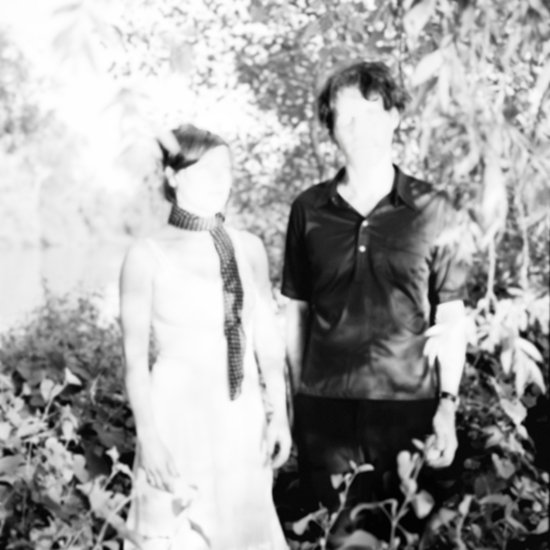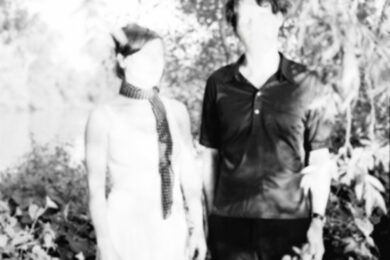Orval Carlos Sibelius, the alter-ego of Axel Monneau, had been dormant since his 2006 eponymous debut. Now, suddenly, there’s a flurry of activity. Recovery Tapes, just out on 10-inch vinyl in France, was recorded in a feverish two-week burst, whereas the previous one apparently took six years, and there’s another album due before the end of the year. Why the rush with Recovery Tapes?
Monneau had booked a holiday to Mali in the aftermath of a romantic break-up and the departure was pending. "I needed to get my ideas on tape as quickly as possible, for posterity," he says. "It was absolutely vital, as I felt my end was near."
He doesn’t get any clearer on the latter point although his label, Clapping Music, mentions a fear of being captured by AQMI (Al-Qaida au Maghreb Islamique), a group of militant Islamists that originated in Algeria. I’m not able to verify this, but I think it’s safe to assume that Monneau was feeling somewhat agitated at this time. But he also appears to have found a kind of release.
"It was crucial that I finished these tracks before leaving for Mali. It was a way of escaping a host of depressing thoughts that were going around my head at that time. It was like therapy, a really felt a lot better when I had finished the album."
(The trip to Mali wasn’t so fraught with peril either. "The French government does everything in its power to discourage people from going over there but it’s pretty relaxed, and I got to meet musicians I admire like N’gou Bagayoko and Papus Diabate.")
Recording and writing had to be fitted around a day job working as a film projectionist. "It’s work that allows me to spend my time daydreaming, reading books, playing guitar and watching films. I’ve written a lot of songs while I’ve been at work. And to think I get paid for that! When I had a free afternoon I used it to record loud guitars at home. But I often finished off the arrangements at night, starting something at 4am with a synth and an effects pedal without really knowing where it was going to take me."
Orval Carlos Sibelius was a lush, often quite elaborately arranged album, combining My Bloody Valentine noise, Robert Wyatt, British psychedelia and jazzy spontaneity. At times it put him close to some of Jim O’Rourke’s more tuneful projects, while at other points it was like the album The Boo Radleys were always been straining to deliver. Following that, Monneau was preoccupied with Centenaire, which saw him band together with three other mavericks associated either with Clapping Music or its now sadly defunct sister label Active Suspension: Damien Mingus (who records under the name My Jazzy Child), Aurélien Poitier, and drummer Stéphane Laporte (aka Domotic). In contrast to the FX-heavy Orval Carlos Sibelius, the group focused on more traditional instrumentation and seemed to be putting themselves over as a kind of agrarian musical co-operative, toiling mysteriously in the vein of the spookier British folk rockers. Awe, dread and the uncanny all had a place in the picture as much as pleasant pastoralism.
They disbanded, he says, because "we went as far we could in that set up. Every song had taken us in a new and interesting direction and we had no desire to repeat ourselves. When I was in Centenaire all my ideas went into the group, which was exciting. I left at a point where I had run out of inspiration; Western music didn’t interest me at all any more. I was happier learning the guitar over again by playing the songs that I loved, by Nico, Nick Drake, Boubacar Traoré, Ali Farka Touré. I didn’t really see the point of writing anything new, why bother trying to match songs that were already perfect? But that cycle is complete now and the inspiration has returned, like a dyke that has finally burst."
Recovery Tapes doesn’t necessarily jettison any of that past (‘Alihyde’ has a similar feel to some Centenaire songs, for example) but, reflecting the circumstances of its creation, it’s grittier, grainier and more immediate. It makes for addictive listening – lilting tunefulness, synth squiggles, abrupt changes, squalls of noise and more than a hint of darkness ("My life is a failure, I may have a cancer" Monneau sings on opener ‘I Don’t Want a Baby’) all crammed into 25 minutes. It’s over almost as soon as you’re starting to absorb it. So you go round again.
"Time spent on recording doesn’t necessarily make for a better record," says Sibelius. "On Recovery Tapes there are some of the most spontaneous things I’ve done since Snark [his first ‘group’, the sound of which he describes as "lo-fi electronica"] It was ‘Bam!’ an idea, ‘Bam!’ record it, ‘Bam!’ an arrangment [he actually says "Hop!" instead of "Bam!" but that probably works less well in English] and that was the song. And then onto the next idea… I’m quite obsessive and a perfectionist in general but I felt a need to connect my more primitive way of making music – just the simple pleasure of a melody, a rhythm."
Recording on an old cassette four track then overdubbing has given Recovery Tapes its appealing rough n’ smooth quality.
"I wanted to rediscover the pleasures of tape, of compression, hiss, everything that makes up the magic of analogue sound. Some tracks were recorded entirely like that. I also used a simple cassette radio for some ideas, that sounds good as well, and I added some tracks afterwards. I like the contrast between a dirtier sound and takes that are recorded with more care."
So the title of the album suggests that its both the document of rebirth and of a certain process and period?
"Yes, it is a document of my night time activities in January and February 2011. I didn’t see many people during that time."
As for the album that will follow Recovery Tapes, it’s currently being mixed by Stephane Laporte/Domotic, he reveals. "The songs are very pop, I wanted to make a record that girls could listen to while eating ice cream. But the recording was frustrating – I wasn’t behind the desk, some of the sounds seemed to be too polished… I had a Dostoevskian desire to destroy everything, or completely sully the sound of the record. We’re kind of in the process of doing that at the moment, as it happens. Recovery Tapes was also a reaction to the recording of that record."
That should also be out on Clapping Music which has, in tandem with Active Suspension, been one of the most distinctive French indies of the last 10 years. The division between the two was always pretty porous but, loosely speaking, AS focused more on practitioners of twisted electronic pop like O.Lamm, Domotic, Hypo and EDH while Clapping covered the folkier side of things, including the aforementioned My Jazzy Child, Orval and early Thee, Stranded Horse as well as Yann Tambour’s pre-Horse post-rock group Encre. Clapping Music scooped up some of the refugees from AS including The Konki Duet, whose recent Let’s Bonappétons, along with Karaocake’s Rows and Stitches, was also overseen by Laporte, making him the go-to man for analogue synth-heavy nouveau girl pop productions.
Monneau’s take on Clapping Music is that "perhaps you have to spend an evening with Julien (Rohel, label boss) listening to Norwegian depressive black metal non-stop while eating California rolls to understand why this label is special."
–
It’s rather typical that Holden’s ‘Best of..’, L’Essentiel, which was released in France a couple of months back, initially escaped my attention. There have never been any fanfares with this group (essentially a duo composed of Armelle Pioline and Dominique Dépret aka Mocke), just 15 years of stately progress. Where the album has been covered in France, writers have dwelt, wistfully or with a degree of puzzlement, on Holden’s inability to permeate the public consciousness (as, indirectly, I am doing here), in brief articles, perhaps situated near the bottom of a page, or at the foot of a column.
Their most recent, and best, album, was called Fantomatisme, which said everything about where they’d got to musically and their status in France. You can stick a Holden record on as background music and it will fulfill that function admirably; Holden, superficially, are EZ, with their tasteful bossa vibes and singer Armelle’s nearly-murmured vocals. But they grow in the mind as the intricacies of the dream-logic arrangements, and the melodic nuances, find purchase. It took three listens before I even noticed a section in the raga-rocky ‘Les Grandes Chevals’, on Fantomatisme, where the whole song appears to be coming out of a stereo at the other end of a deserted beach.
After their sparky debut L’Arriere Monde combined indie noise-pop flirting with exotica, jungle, krautrock and trip-hop, the increasing insubstantiality (not meant as a criticism!) of their sound has been a work in progress with Czech producer and polymath AtomTM (aka Atom Heart/Señor Coconut) since he and the group began collaborating on album two, Pedrolira. The swinging yé-yé groove of that records’s ‘Je Te Reconnais’ and the striking soundtrack-isms have gradually been sublimated. Though even Fantomatisme is clearly still a collection of songs in the old-fashioned sense – very well-structured songs at that – it seemed more likely than ever that they might just evaporate before your ears.
According to Mocke, "We’ve often been told that there was something hidden in our songs, in the lyrics as well as in the music. What you hear at first is not the whole of it, there’s a frame behind that carries the ensemble but there are different layers of transparency or opacity that sometimes need to be looked through."
Clearly, this kind of sonic sophistication and subtle deconstruction of the song form doesn’t earn you critical garlands and mass acceptance in France nowadays. They’re absolutely mad for it in Chile, though.
For more from Rockfort, you can visit the official site here and follow them on Twitter here. To get in touch with them, email info@rockfort.info.



